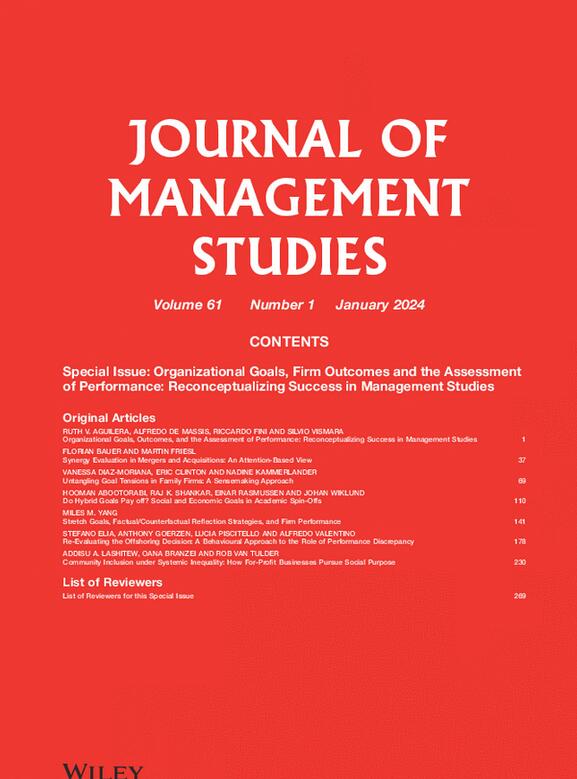Industry Exposure to Artificial Intelligence, Board Network Heterogeneity, and Firm Idiosyncratic Risk
IF 6.4
1区 管理学
Q1 BUSINESS
引用次数: 0
Abstract
Despite the growing impact of artificial intelligence (AI) in business, there is little research examining its effects on firm idiosyncratic risk (IR). This is an important issue for boards: as key conduits of firm–environment information flows via board interlock networks, traditional risk oversight functions are being increasingly augmented with strategic decision‐making and communications. Accordingly, we explore how AI and board interlocks independently and interactively affect IR, focusing on the heterogeneity of the board's network ties. We hypothesize these effects within signalling theory, positing that a firm's AI exposure and board network will differentially affect market perceptions of risk contingent on their perceived cost and relative signal strength under different environmental conditions. We find that while AI and board network heterogeneity both favourably affect risk, operating in a high‐AI industry while occupying a network position that spans industry boundaries mitigates these effects, leading to an increase in IR for firms in the most technologically advanced industries. Additional analyses of diversification corroborate these theoretical mechanisms: as a costly signal of competence across multiple domains, diversification enables firms to simultaneously engage with AI and diverse knowledge networks without market penalties. Our findings offer practical insights for directors and avenues for theoretical development.行业对人工智能的接触、董事会网络异质性和公司的偶发性风险
尽管人工智能(AI)在商业领域的影响与日俱增,但很少有研究探讨其对公司特异风险(IR)的影响。这对董事会来说是一个重要问题:作为通过董事会联锁网络实现公司-环境信息流动的关键渠道,传统的风险监督职能正日益被战略决策和沟通所增强。因此,我们探讨了人工智能和董事会联锁如何独立地、交互地影响投资者关系,重点关注董事会网络联系的异质性。我们根据信号理论对这些影响进行了假设,认为在不同的环境条件下,公司的人工智能风险和董事会网络将根据其感知成本和相对信号强度对市场的风险感知产生不同的影响。我们发现,虽然人工智能和董事会网络的异质性都会对风险产生有利影响,但在高人工智能行业经营,同时占据跨越行业界限的网络地位,会减轻这些影响,从而导致技术最先进行业的公司的投资者关系增加。对多元化的其他分析也证实了这些理论机制:作为跨领域能力的高成本信号,多元化使企业能够同时参与人工智能和多样化的知识网络,而不会受到市场惩罚。我们的研究结果为董事们提供了实用的见解,也为理论发展提供了途径。
本文章由计算机程序翻译,如有差异,请以英文原文为准。
求助全文
约1分钟内获得全文
求助全文
来源期刊

Journal of Management Studies
Multiple-
CiteScore
16.40
自引率
5.70%
发文量
99
期刊介绍:
The Journal of Management Studies is a prestigious publication that specializes in multidisciplinary research in the field of business and management. With a rich history of excellence, we are dedicated to publishing innovative articles that contribute to the advancement of management and organization studies. Our journal welcomes empirical and conceptual contributions that are relevant to various areas including organization theory, organizational behavior, human resource management, strategy, international business, entrepreneurship, innovation, and critical management studies. We embrace diversity and are open to a wide range of methodological approaches and philosophical perspectives.
 求助内容:
求助内容: 应助结果提醒方式:
应助结果提醒方式:


